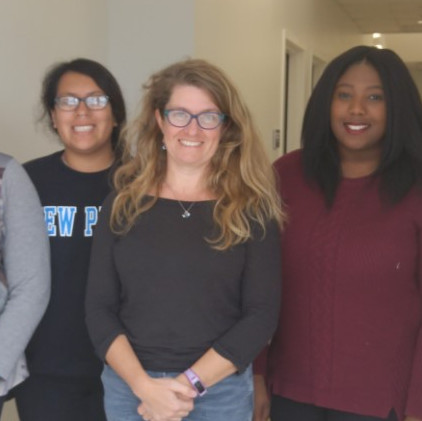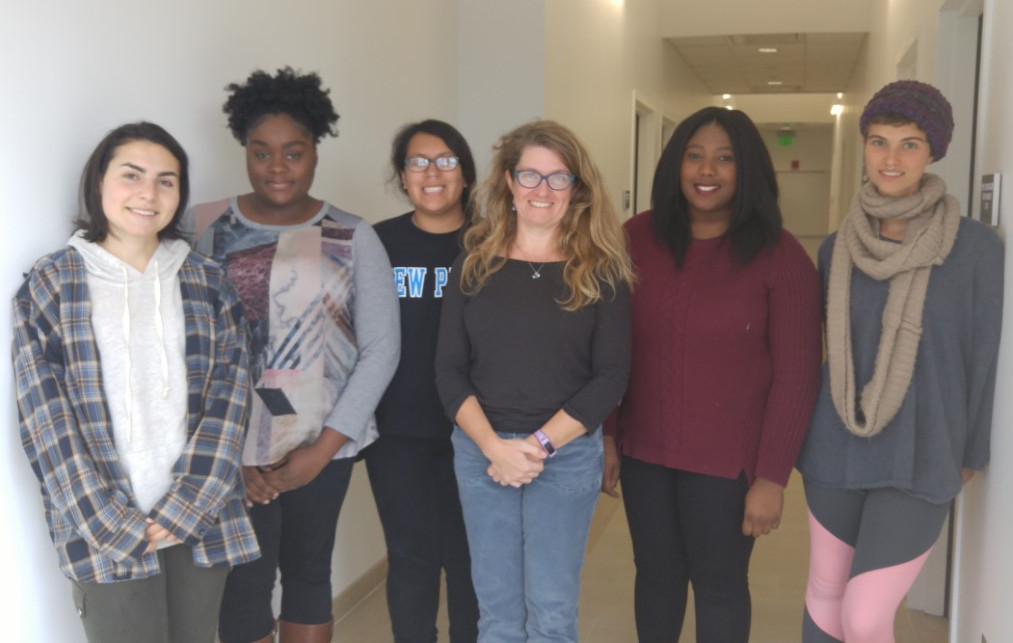Psychology Students Give Voice to Women’s Experiences of Sexual Objectification
Last October, New Paltz High School tenth-grader Maya Gold was under the influence of over-the-counter cough and cold medicines when she took her own life. In an article published on Jan. 7, 2016, in the New Paltz Times, Gold’s parents said they’d found sexually objectifying text messages on their late daughter’s cell phone, which they believed contributed to her suicide. “Seeing your daughter called by some of these names, especially someone as sensitive as Maya — it’s too much for a 14-year-old,” said Maya’s mother, Elise Gold. “It’s too much for anybody.”
In reading these words, Melanie Hill, an associate professor of psychology and coordinator of the graduate counseling program, felt a call to action. “It was one of those moments of ‘I need to do something. I’ve got all of this research, this is my area – objectification – and this is something the students are struggling with,’” said Hill.
Gold’s death inspired Hill to revisit and reimagine a decade-old research project on sexual objectification. In 2005, she and nine undergraduate psychology and graduate counseling students interviewed 45 women about their experiences of being treated as sexual objects. Though the prevailing scholarship defined sexual objectification in terms of negative mental health consequences, Hill’s research group discovered that women’s experiences were more complex than the scholarship proposed.
In her review of the data, Hill found that experiences of sexual objectification could be both damaging and uplifting, and women’s narratives often contained “complexities, contradictions and nuances.” Women who described fearful experiences also recalled moments when being the object of a gaze made them feel more self-confident or powerful.
Hill and a new research team began work this summer on identifying methods for transforming the original interviews into dramatic monologues that shed light on women’s complex and contradictory experiences with sexual objectification. The ultimate goal of the project is to perform the monologues in front of New Paltz High School students. The project will also invite high school students to take part in a participatory action project, where they will investigate their own research questions related to sexual objectification, agency and empowerment.
Psychology undergraduates Leslie Castro-Tapia ’17, Claurie Lindor ’18 and Kayla Sigmone ’18 began work with Hill this summer, with support from the AC² Summer Research Program. The AC² (AMP & CSTEP Community) Program at SUNY New Paltz is a program of academic support and enrichment for students intending to major in the science, technology, engineering, mathematics (STEM) fields and certain majors that lead to professional licensure, including psychology. The goal of the program is to increase the number of economically disadvantaged and traditionally underrepresented students who earn degrees in these areas.
Students Devin Bailey ’16 (Psychology) and Angela Mastandrea ’17 (Expressive and Healing Arts – Contract Major) joined the research team this fall. The project has allowed the five female students to reflect on their own experiences with sexual objectification in pursuing a project they described as “powerful,” “positive” and “therapeutic.”
“Starting from the summer, I didn’t know what sexual objectification was, and how it can negatively affect or positively affect women’s lives,” admitted Sigmone. “I had to look into experiences I’ve had and relate to the information that we were looking at. This led to having conversations with friends and family, and it was really eye-opening. I think this research is very powerful because it’s something a lot of people go through.”
Castro-Tapia appreciated the opportunity to apply her studies of objectification to interviews that cross generational boundaries. “One of the participants is 80-something years old, and it’s interesting to see how her experience can also be similar to someone who’s dealing with sexual objectification now. It changes but it’s still prevalent in our society, and now we can try to fix it. It’s nice to be involved and be a part of something like this,” she said.
This summer, the research group studied ethnotheater, a method used to create dramatic presentations out of significant passages of interviews, journal articles or other media sources. The students read two interviews and experimented with different types of monologues. One student rearranged the words of an interview while being faithful to the speaker’s message, while another took material from multiple interviews to highlight a particular theme.
The students gave oral presentations of their work, and Sigmone delivered this powerful monologue, which she created from the interviews:
“Pissed off! Yeah! I am pissed off! Because as the seconds turn to minutes and their stares invoke a glare… for the first time in my life I feel helpless. Not helpless like a baby dependent on their mother, or an old person trying to get up. But helpless like an Old Navy mannequin. You may laugh, but have you seen those things? Glistening smile. Confident. Fashionable. Bright eyes. Dazzling personality. A bit too relatable. So caught up in our own everlasting cycle of perfection, that we are unable to see the bigger picture. Unable to help. Helpless. So yeah, I am pissed off. Because as the seconds turn to minutes and their stares invoke a glare…for the first time in my life I see the bigger picture.”
Hill said she got “goosebumps” listening to the students’ monologues. “It’s really neat to think of all the ways you can take an interview, with wanting to honor and be ethically responsible to the participant’s story….It got all of us thinking about the creative ways it could be performed,” she said.
Hill took advantage of an opportunity to take three of the students to a TMI Project performance in Kingston honoring Eve Ensler, creator of The Vagina Monologues. The TMI Project, which performs in venues throughout the Hudson Valley, asks people to write about their most shameful experiences and perform their writings in front of others.
Mastandrea attended the TMI performance and said she’s excited about the different options the group is considering for performing the monologues. “I think there’s tremendous healing power in combining the arts with psychology,” said Mastandrea, whose contract major combines coursework in the visual arts, psychology and education.
This fall, the students have begun applying the Listening Guide, a qualitative research method, to a selection of the 45 interviews. The Listening Guide offers a means of identifying a range of positive and negative associations of sexual objectification that exist in the interviews. Hill said the Listening Guide has been effective in helping her students identify subtleties present in the narratives. “There might be different voices even within the same paragraph. One talking in an objectified voice, and another talking in more of an agentic voice, being more filled with agency as opposed to feeling like an object,” Hill said.
The research group meets once a week for an hour, and the students have enjoyed the free-flowing exchange of ideas and information. “I feel like it’s an open conversation,” said Sigmone. “In class sometimes you do have that, but I feel like here it’s an open space where you can say your thoughts. People bounce off of everybody.”
“It’s exciting because we get to have a say in it, and it’s constantly evolving,” added Mastandrea. “It feels like the saying ‘the medium is the message.’ It’s almost like the process of figuring all this out is helping me draw connections in my own life on the topic of objectification, agency and empowerment. It’s really exciting.”
Above photo: Melanie Hill, an associate professor of psychology and coordinator of the graduate mental health counseling program, leads undergraduates (from left) Angela Mastandrea, Kayla Sigmone, Leslie Castro-Tapia, Claurie Lindor and Devin Bailey, in a research project studying women’s experiences of sexual objectification.


